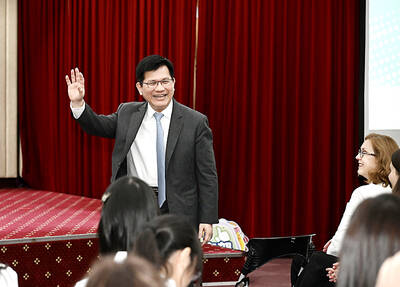North Korean troops sent to fight alongside Russia in its war against Ukraine have not been seen in battle for several weeks, raising speculation that they have been withdrawn after experiencing heavy losses, South Korea’s spy agency said.
The South Korean National Intelligence Service this week confirmed media reports that North Korean troops had been pulled from the front lines in about the middle of last month.
North Korea began sending an estimated 11,000 troops to the Russian Kursk region late last year, soon after North Korean leader Kim Jong-un and Russian President Vladimir Putin agreed on a mutual defense pact designed to strengthen their alliance against what they called a US-led “Western hegemony.”

Photo: AP
Their involvement has come at a heavy price. Intelligence officials in South Korea said about 300 North Koreans had been killed and about 2,700 wounded.
Last month, Ukrainian President Volodymyr Zelenskiy posted a clip on social media showing two captured North Korean soldiers, one of whom said his commanders had told him he was being sent on a “training exercise.”
North Korean soldiers, who had not seen combat before being deployed, were said to have been unprepared for the harsh realities of warfare in unfamiliar terrain and particularly vulnerable to Ukrainian drones.
Intelligence officials in South Korea said notes had been found on dead North Korean soldiers indicating that the regime expected them to kill themselves rather than be taken prisoner.
The arrival of North Korean troops triggered fears that the war could take a dangerous turn for Ukraine, amid claims by military officials in South Korea that the regime in Pyongyang was preparing to send even more troops.
In return for sending personnel, weapons and ammunition, North Korea is hoping to gain access to sophisticated Russian satellite technology and earn foreign currency to fund its nuclear and ballistic missile programs.
The South Korean National Intelligence Service said the large number of casualties was a factor in the apparent decision to withdraw North Korean soldiers from Kursk, where Ukrainian forces launched a surprise offensive in August last year.
As many as half of the North Korean troops sent to Ukraine have been killed or injured in Russia’s “war of attrition,” said Seth Jones, director of the international security program at the Center for Strategic and International Studies in Washington.
“The casualty rates were significant,” Jones said during a podcast appearance. “By most accounts, we were able to take a look at somewhere between a third and probably on the real high end, maybe 50 percent casualties among the North Korean forces.
“Again, [it’s] hard to know exactly what reality is ... with as many as 1,000 killed. Those are pretty staggering casualties for a force of 11,000 [to] 12,000,” he said.

FIREPOWER: On top of the torpedoes, the military would procure Kestrel II anti-tank weapons systems to replace aging license-produced M72 LAW launchers Taiwan is to receive US-made Mark 48 torpedoes and training simulators over the next three years, following delays that hampered the navy’s operational readiness, the Ministry of National Defense’s latest budget proposal showed. The navy next year would acquire four training simulator systems for the torpedoes and take receipt of 14 torpedoes in 2027 and 10 torpedoes in 2028, the ministry said in its budget for the next fiscal year. The torpedoes would almost certainly be utilized in the navy’s two upgraded Chien Lung-class submarines and the indigenously developed Hai Kun, should the attack sub successfully reach operational status. US President Donald Trump

Taiwan Semiconductor Manufacturing Co (TSMC, 台積電) is expected to start construction of its 1.4-nanometer chip manufacturing facilities at the Central Taiwan Science Park (CTSP, 中部科學園區) as early as October, the Chinese-language Liberty Times (the Taipei Times’ sister newspaper) reported yesterday, citing the park administration. TSMC acquired land for the second phase of the park’s expansion in Taichung in June. Large cement, construction and facility engineering companies in central Taiwan have reportedly been receiving bids for TSMC-related projects, the report said. Supply-chain firms estimated that the business opportunities for engineering, equipment and materials supply, and back-end packaging and testing could reach as high as

ALL QUIET: The Philippine foreign secretary told senators she would not respond to questions about whether Lin Chia-lung was in the country The Ministry of Foreign Affairs on Wednesday confirmed that a business delegation is visiting the Philippines, but declined to say whether Minister of Foreign Affairs Lin Chia-lung (林佳龍) is part of the group, as Philippine lawmakers raised questions over Lin’s reported visit. The group is being led by Deputy Minister of Agriculture Huang Chao-chin (黃昭欽), Chinese International Economic Cooperation Association (CIECA) chairman Joseph Lyu (呂桔誠) and US-Taiwan Business Council (USTBC) vice president Lotta Danielsson, the ministry said in a statement. However, sources speaking on condition of anonymity said that Lin is leading the delegation of 70 people. Filinvest New Clark City Innovation Park

TPP RALLY: The clashes occurred near the Chiang Kai-shek Memorial Hall on Saturday at a rally to mark the anniversary of a raid on former TPP chairman Ko Wen-je People who clashed with police at a Taiwan People’s Party (TPP) rally in Taipei on Saturday would be referred to prosecutors for investigation, said the Ministry of the Interior, which oversees the National Police Agency. Taipei police had collected evidence of obstruction of public officials and coercion by “disorderly” demonstrators, as well as contraventions of the Assembly and Parade Act (集會遊行法), the ministry said in a statement on Sunday. It added that amid the “severe pushing and jostling” by some demonstrators, eight police officers were injured, including one who was sent to hospital after losing consciousness, allegedly due to heat stroke. The Taipei